Great English Vocabulary Books to Accelerate Your Learning

Are you having a difficult time building your vocabulary?
If so, you’re not alone.
Many English language learners feel that English vocabulary exercises are one of the most challenging parts to mastering English.
When I learn a new language, I like to take a learning approach that’s exciting and keeps me engaged. If you’re anything like me, the thought of sitting down and reviewing 50 flashcards sounds like a terrible way to spend the afternoon. Fortunately, building your vocabulary doesn’t have to be!

Why having a big English vocabulary is important?
Building your vocabulary is one of the most important parts of learning a new language. In some ways, having a large vocabulary is more important than knowing the right grammar rules and word order.
Your extensive vocabulary allows you to be understandable, which is important if you’re in a situation where you’re in dire need of expressing yourself.
You never know if you’ll ever need to say, “My passport is lost,” or “I have food poisoning.” Even if you haven’t mastered English grammar, your vocabulary knowledge may mean the difference between getting help or not.

Exciting ways to build your vocabulary
Learning English is supposed to be fun and engaging, and sitting at your desk memorizing flashcards is anything but that. Fortunately, there are a number of exciting ways to build your vocabulary that don’t involve flashcards and drilling.
One of the best ways to make learning vocabulary exciting is to get motivated. Maybe you’re getting together with your conversation group at a fancy restaurant and you’ll need to make small talk. Or perhaps you’ve got a big trip coming up and need to learn a bunch of essential English words and phrases that travelers need. You’ll be much more inclined to ditch the flashcards and pick up one of those books for tourists.
Okay, so maybe you don’t have a big dinner or trip planned. That just means you’ll have to get creative with your approach and find what works for you. There are a number of alternative ways to learn vocabulary that don’t involve drilling and flashcards; learning English has never been easier! Here are some tips to help you increase your vocabulary:
- Know the context of the words you learn. Pay attention to how they’re used in sentences.
- Use new words as much as possible. Mention them in your conversations and include them in your writing.
- Start simple. Learn the words that you use the most in your day-to-day activities. Things involving time, food and daily routine are good.
- Learn in groups. Types of food, modes of transportation, vocabulary for hospital visits are all great groupings. Learning words randomly, like “cheese” and then “submarine,” is only going to confuse you.
- Stay away from opposites. Don’t mix opposites in with your groupings, it’ll only confuse you. Stick with synonyms.

6 English Vocabulary Books
1. “McGraw-Hill Essential ESL Dictionary”
The first thing you’re going to need is a good dictionary so you can look up those interesting words you come across.
The advantage of this dictionary is that it has been created specifically for the English language learner. This means that the book has been designed in a way that’s easy to understand so that nothing gets lost in translation.
There are also a number of additional resources that come with the dictionary. There are sections that cover grammar rules and conversational English. There’s even a section filled with vocabulary words and pictures showcasing different themes like electronics, animals or classroom vocabulary.
If you really like the book and want to sound like a native English speaker, consider using this book alongside “The American Idioms Dictionary” and “Dictionary of American Slang and Colloquial Expressions,” which are also books by McGraw-Hill. These vocabulary books will help you learn the funny, unique and sometimes strange expressions that (American) English speakers say in conversations.
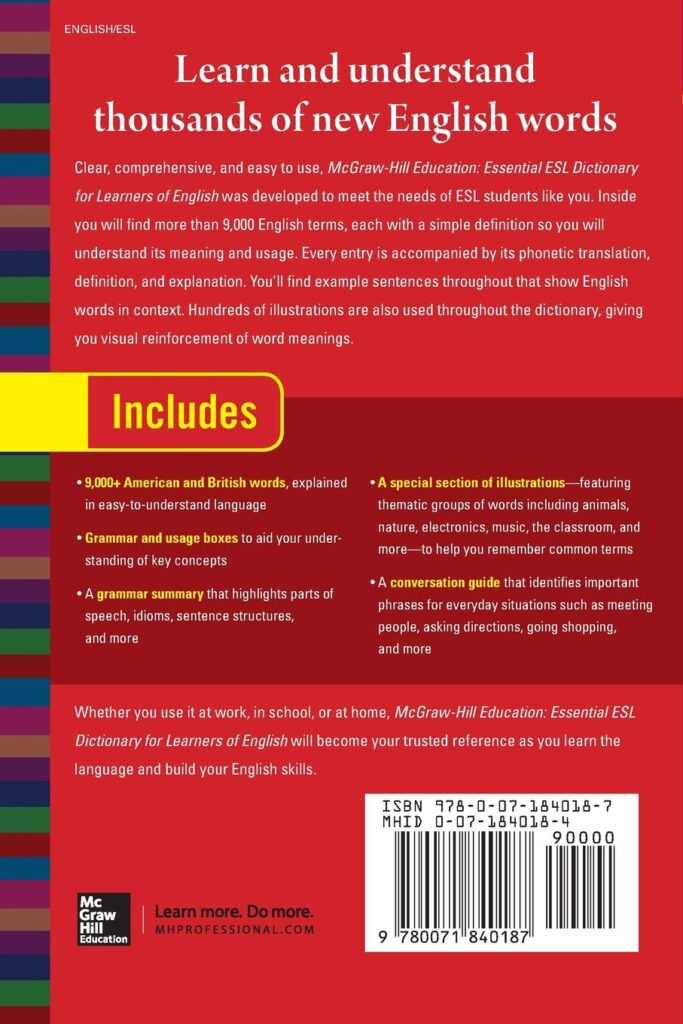

2. English Vocabulary in Use Series
The English Vocabulary in Use series is a best-selling series of books by Cambridge University Press that help English students of all levels improve their vocabulary and work towards mastering the English language. One of the nicest features of this series is that students can choose to study American English or British English, which is great for people preparing for IELTS or TOEFL.
Another thing that’s nice is that the books are tailored for different skill levels. The series includes:
“Basic Vocabulary in Use“
“Elementary Vocabulary“
“Pre-intermediate and Intermediate Vocabulary“
“Upper-Intermediate Vocabulary“
“Advanced Vocabulary“
“Basic Vocabulary in Use” teaches 1,200 of the most important English words and is perfect for beginners. The rest of the series introduces thousands of words unique to the skill level, with terms getting technical and more specific with each new book.

3. “Oxford Picture Dictionary”
If you’re a visual learner like me, you can really appreciate a dictionary that relies on beautiful photos and illustrations to teach vocabulary. “The Oxford Picture Dictionary” is perfect for this and also includes target vocabulary sections, pre-reading questions and stories to help you see the context of the words covered.
They even have bilingual versions of the dictionary, so you can find one that uses English and your native language.


4. “504 Absolutely Essential Words”
This vocabulary book is best for people who want to learn survival English or need to build a strong foundation before moving on to more advanced material. Like the name suggests, it covers more than 500 of the most important and frequently used words in English.
This book is also great for students preparing for English proficiency tests and comes filled with supplemental material that makes learning vocabulary quick and painless. You get easy-to-understand sample sentences, short reading passages and world-building exercises that help you learn how to understand words in context.

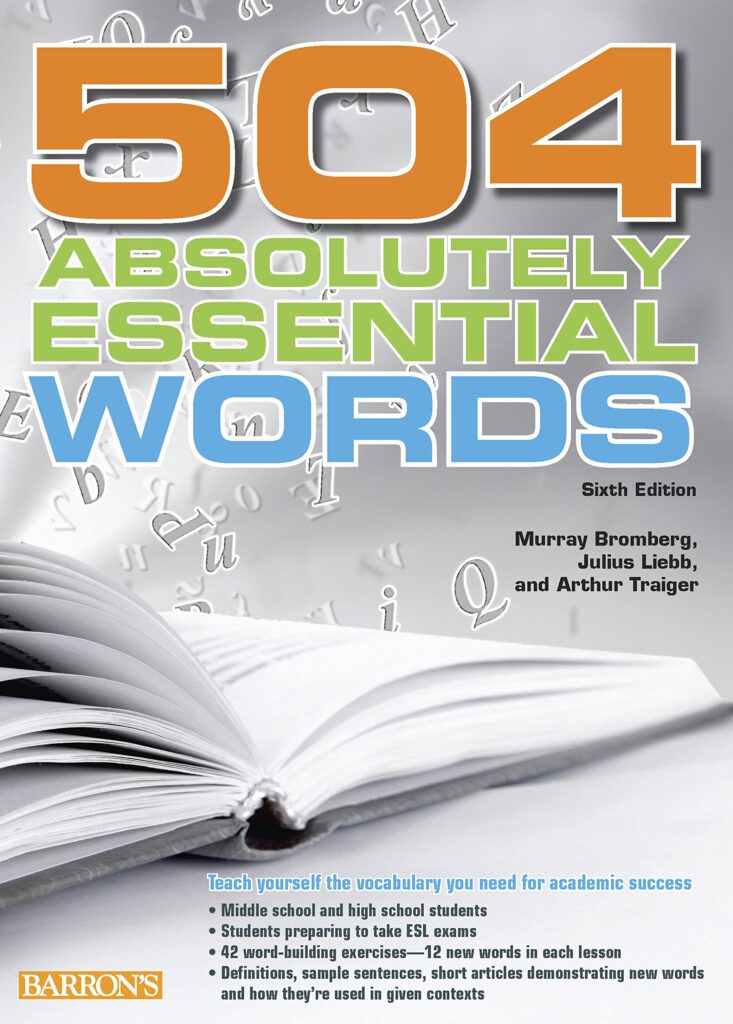
5. “NTC Vocabulary Builders”
Another easy-to-use vocabulary book by McGraw-Hill is “NTC Vocabulary Builders.” This book is designed for advanced English learners who need assistance with English vocabulary used in a professional setting. This makes this series of books perfect for students who are learning business English or need to be a proficient English speaker at work.
The “Blue Book” is the advanced version and is for upper-intermediate and advanced learners. There’s also a “Green Book” for high beginners and the “Red Book,” which is designed for intermediates students. All three levels are quite challenging compared to other books, which is why they’re only recommended for serious learners preparing for proficiency tests or need to learn English for their profession.


6. “Word Power Made Easy”
Do you want a fun way to learn 1,000 of the most frequently used words in the English language? “Word Power Made Easy” is the right book for you! It has various games and activities that’ll help you learn in an enjoyable way.
The vocabulary words come with a number of explanations that put definitions into context, so you can get a better idea of how to properly use these words in conversation and writing. If you’re a big-picture thinker, you’ll love how these descriptions provide you with helpful background information. Additionally, this book is loaded with valuable tips on how you can maximize your study habits and learn more words in less time!
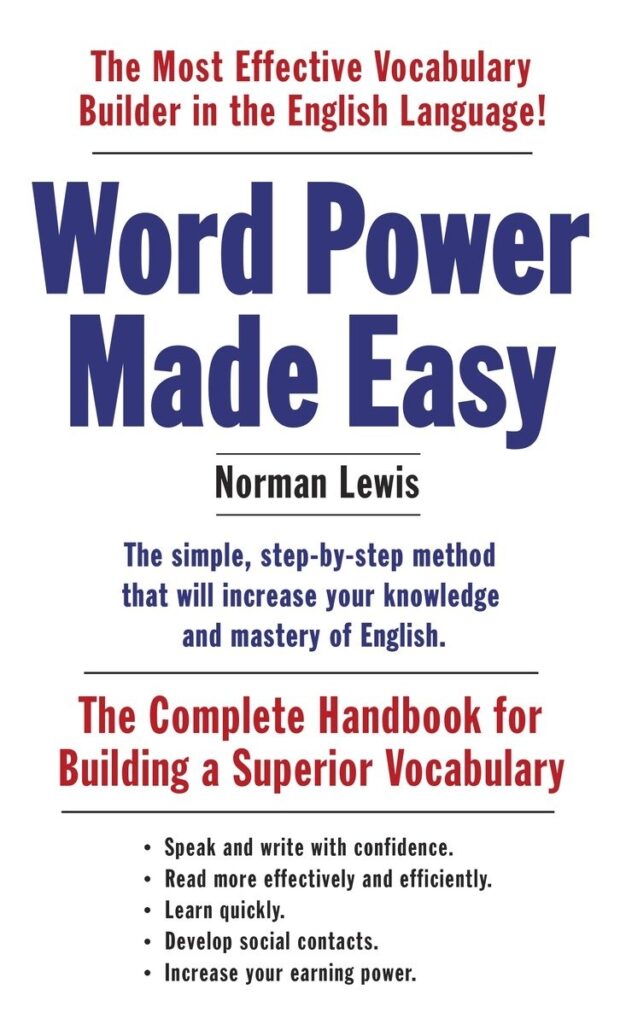
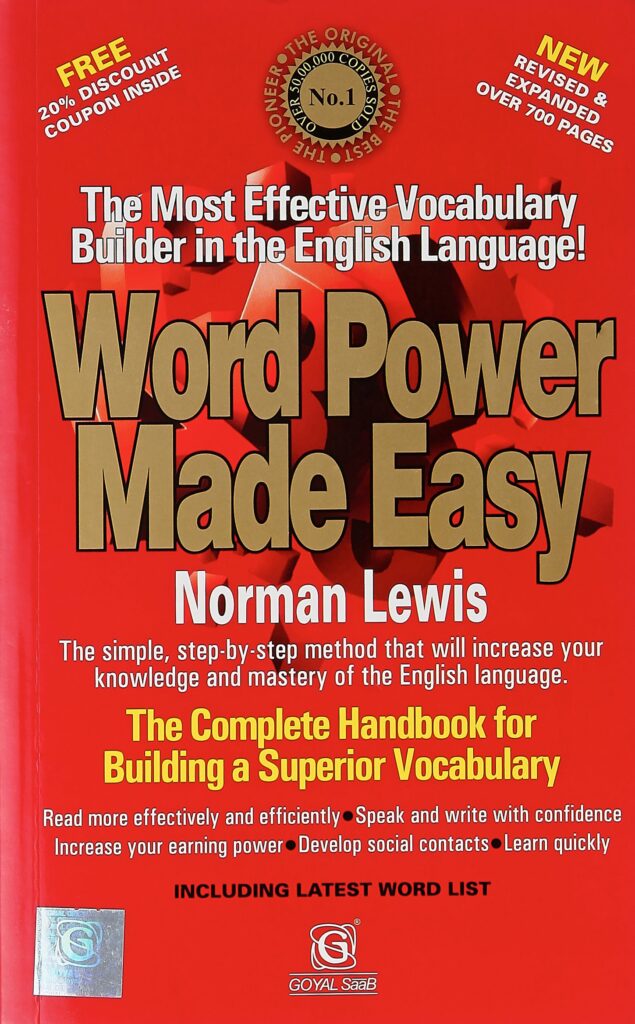
Improve your vocabulary today
The best way to build an enormous vocabulary is immerse to yourself in English. Use sites like YouTube to watch English video clips and listen to English music. If you’re just starting out, try reading some articles on Wikipedia’s Simplified English page.
These resources will help you remember the material covered in your vocabulary books, which will let you build your vocabulary much quicker. They’ll also help make the learning process fun and refreshing, as nobody wants to read textbooks all day!



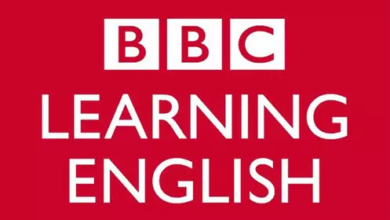





kheili awli